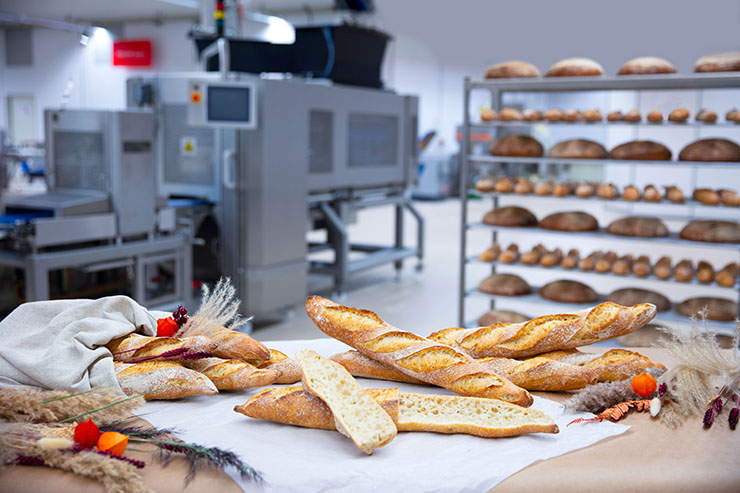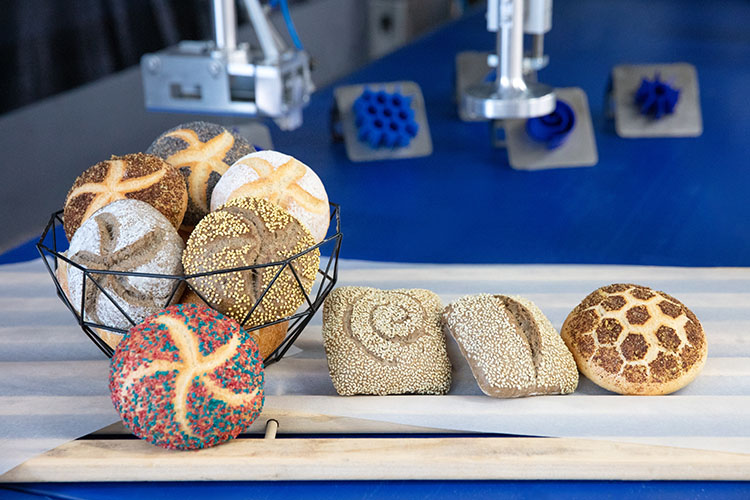
Bread consumption is once again on the rise, with the market expected to grow annually by 6.80%1 and reach a worldwide volume of 216.70 bn kg by 2028. The technology to support efficient, automated production of high-end, quality bread is here. The key is gentle dough handling.
Per capita, bread consumption should be over 24 kg this year, and it is poised for steady growth. Among the categories that entice consumers, artisan-style breads, premium ranges and perennial favorites such as baguettes are popular choices.
”The centerpieces of our SoftProcessing
technology are the dough sheeter SDS and the satellite head.”
FRITSCH specialists
“With a special sheeting technology (which also includes an improved dough sheeter for soft doughs), not only do we save a lot of space, but we also produce a uniform dough sheet and reduce scrap dough,” FRITSCH highlights. All the components of the line are designed with the new hygienic design; they offer improved accessibility, are easy to clean and are washdown capable. There are different options available to ensure high flexibility when manufacturing a wide range of products. The line’s modular design means it is always configured according to the needs of the individual operation. Various features can be integrated into existing lines, such as decoration units, for example.
For process consistency, FRITSCH equipped the IMPRESSA bread (and all its industrial lines) with a new, output-based line control. How does it work? The operator simply has to enter the number of products he wants to produce per hour and the line calculates all the necessary parameters to achieve this result. “The software even checks whether the desired performance change is feasible quality and reproducible results,” the specialists explain.

Soft processing technology
The modular design of the IMPRESSA bread supports the manufacturing of a wide range of products, either cut, roundmolded, or long-molded shapes. Rye dough or special doughs, for example for Pinsa, can easily be processed. Moreover, strewn products or special decorations are also possible, utilizing the product decoration unit.
The Dough Sheeter SDS on the IMPRESSA bread can process soft doughs with a long pre-proofing time, and it does so very gently and with a minimum amount of oil. FRITSCH explains the principle of the SoftProcessing Technology supporting the process: “The centerpieces of our SoftProcessing technology are the dough sheeter SDS and the satellite head. In the SDS, a sensor monitors the filling level above the two-star rollers. This ensures that there is always a constant level of dough above the star rollers and that no compression of the dough occurs. If dough is needed, it is automatically fed through the conveyor belt. The big advantage of the SDS is that it flours the dough sheet on all sides. For the outer sides of the dough sheet, we use a fold-up belt (FRITSCH patent) which is previously dusted with flour. Flouring the dough sheet on all sides means that there is no need for oil during further processing.”
The SDR then sheets the dough very gently. The satellite head technology produces a consistently uniform dough sheet. Even its edges are homogenous, as no shearing forces and separating agents are used. Stretching and compressing are avoided at transfer points with the use of knife edges. In addition, drop heights are also either avoided entirely or reduced to a minimum. “This allows even soft and rye dough to be processed reliably,” FRITSCH explains. The use of non-contact dough loop control helps with stress-free dough processing, with the added benefit of high accuracy in shape and weight, over the entire width of the dough sheet. In this way, scrap dough is reduced to a minimum.

And process-control software
Process efficiency can be optimized by integrating the FRITSCH Smart Services. With the ‘Smart Production Insights’ (SPI) service, operators have access to live production updates and ensure complete process transparency. “Production managers or shift supervisors want to have an overview of the most important performance data of the equipment in as close to real-time as possible, even more so in the case of downtimes caused by minor malfunctions, or the maintenance status of the equipment.” FRITSCH explains.-
The latest Smart Service FRITSCH developed is the so-called ‘Watchdog’ for the line drives, which constantly measures and analyzes their operating parameters. As soon as the deviation from the empirical value exceeds a certain limit, the production manager receives a warning to check the motor at the next maintenance and, if necessary, to replace it before it breaks down.
A flexible product portfolio
The IMPRESSA bread is most frequently used to manufacture round-molded products with long pre-fermentation times. Many lines are also equipped with a baguette unit for long-molded products. FRITSCH can offer several features that can be integrated into existing lines to further increase the product variety that can be made with them. “Our latest product innovation is for twisted bread rolls, which can now be produced fully automatically, in high volumes, with the new Dough Twisting Unit (DTU) on our IMPRESSA bread,” FRITSCH reveals.
With the Product Decoration Unit (PDU), decoration patterns can be printed or cut into the surface of products, for unique-looking products. The machine can make decorations by pressing or cutting shapes into the dough, not only on round-molded products but also on rectangular and long-molded ones. In addition to molded bread rolls, dough pieces can also be stamped/punched or cut out, then decorated with a pattern. Products of virtually any weight can be processed: a vision system ensures that the desired pattern is always applied exactly in the center of the product.
The article is part of an extended feature, which was originally published in [BBI 4 – 2023]. Read the full article in the magazine:


